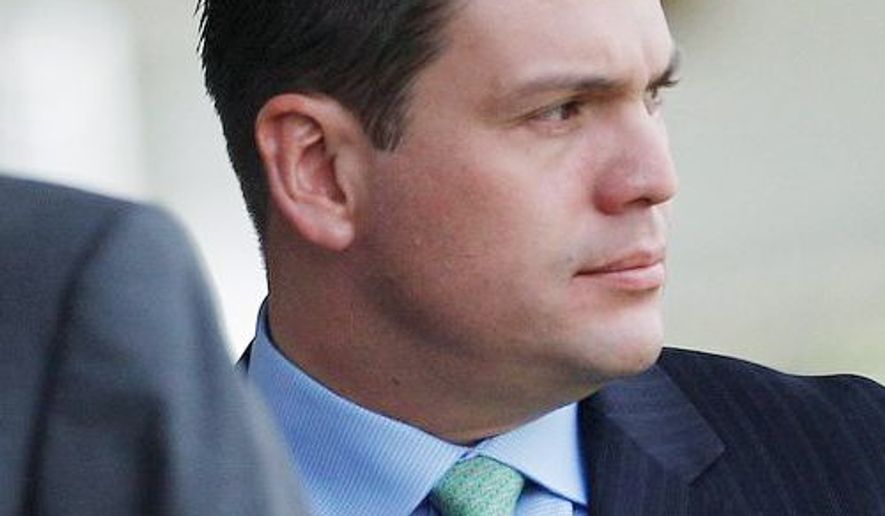There will be no role for Colombia’s leftist FARC guerrilla movement in the nation’s armed forces even if peace talks now underway produce an end to the country’s long civil war, Colombian Defense Minister Juan Carlos Pinzon said Friday.
The government and FARC negotiators who have been meeting in Cuba for two years are struggling reach a deal, with one key sticking point how to deal with the leaders and the foot soldiers of the Revolutionary Armed Forces of Colombia, which has been battling the government for a half-century and still controls significant portions of the country.
Mr. Pinzon, speaking Friday at a session hosted by the Inter-American Dialogue during a visit to Washington, said his ministry regularly handled individual cases of ex-guerrillas from the FARC and the smaller National Liberation Army of Colombia (ELN) who agree to disarm, but that the FARC itself could have no role in the future in the country’s armed forces.
“No,” he replied tersely, when asked about the possibility.
The 43-year-old Mr. Pinzon, who has been Colombia’s defense minister since 2011, said the country’s armed forces and national police stood ready to make any peace deal work, despite the long and bloody fight with the FARC. He claimed at one point that the Colombian military was the “architect” of the current peace process.
FARC leaders would not even have been able to travel to the reconciliation talks in Havana without the “help and support” of the armed forces, Mr. Pinzon said.
“We may not all agree with every presidential order, but we have carried them out with discipline,” he said.
The Havana talks have produced agreement in some areas, including rural development and move to curb drug trafficking. Colombian military officials met with FARC guerrillas for the first time ever in August to discuss how to implement a ceasefire and demobilize and disarm the guerrilla forces.
But the question of “transitional justice” — an accounting of the atrocities committed by both the guerillas and pro-government paramilitary groups — has proven more difficult to settle, with rising political support for the idea that the main leaders of the FARC must pay for their actions.
There have been hopeful signs recently in the conflict, the only shooting war in the Western Hemisphere. Mr. Pinzon said that Bogota, with help from both Democratic and Republican administrations under the U.S. Plan Colombia, has made marked military and economic progress since the turn of the century. The FARC has gone from 23,000 fighters in 2000 to an estimated 6,500 now, and the ELN has also lost strength, while the number of terror attacks and homicides also were down last year.
The FARC last month said it would observe a unilateral, “indefinite” ceasefire, and the government of President Juan Manuel Santos agreed in turn to “de-escalate” its military operations.
But Mr. Pinzon noted that despite the ceasefire and a halt to attacks on the country’s infrastructure, the FARC continues to engage in a number of illegal activities, including drug trafficking, extortion, illegal mining and the use of child soldiers, which the government has an “obligation” to address.
Mr. Pinzon’s ministry oversees both Colombia’s military forces and its national police force. He said the security forces will need to remain at their present strength for as much as a decade after any final peace deal is signed, to guarantee that the agreement is properly implemented.
But, he also joked, “if a minister of defense is not asking for more money, he’s not doing his job.”
On another issue, the Colombian defense minister strongly attacked a Human Rights Watch report issued last week that criticized what it said were abuses by the FARC, government forces and private paramilitary groups allied with the government. While the Santos government has criticized the abuses, the “lack of effective investigations means perpetrators are rarely arrested.”
The report also faulted Mr. Pinzon and senior military officials for trying to “discredit” judicial probes into cases where government-backed forces inflated casualty counts by killing civilians and labeling them as guerrillas, and for backing legislation to make proving such cases more difficult.
Mr. Pinzon criticized the rights groups for “personalizing” its criticism, and said the legislation had not been proposed “capriciously.”
The reforms “have been drafted by experts in constitutional rights,” he said, speaking in Spanish. “I don’t know why they want to personalize something that has been subject to an open and transparent debate” in the legislature.
• David R. Sands can be reached at dsands@washingtontimes.com.




Please read our comment policy before commenting.